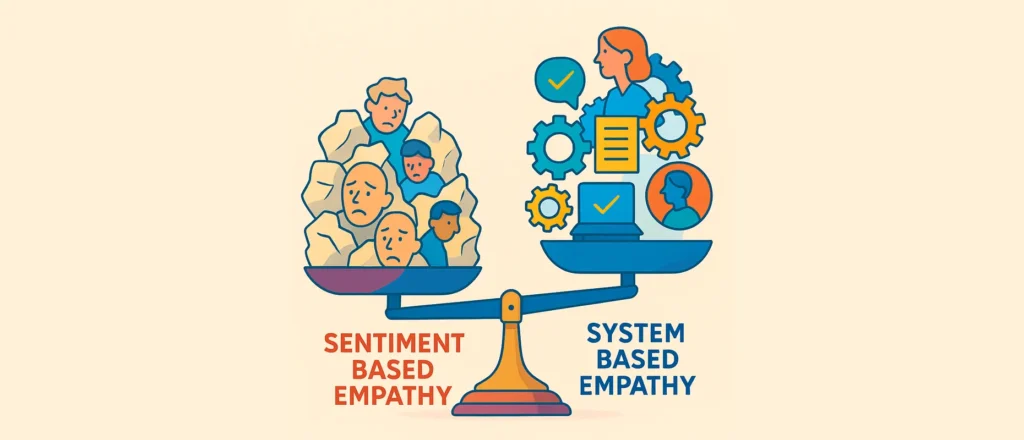A few weeks ago, I watched a manager pause for almost ten minutes before sending a message. The message was meant to address a team member’s repeated delays, but she kept rewriting it-trying to be “empathetic.” Not because she did not know what to say, but because she was trying not to be hurtful. Neither was she being honest, nor clear, she just wanted to be safe!
And I kept wondering:
When did empathy start making us hesitant to lead?
When Empathy becomes a shield, not a skill
“Lead with empathy.”
“Empathy-first workplaces are the future.”
“Managers must be more empathetic.”
We hear these phrases everywhere – HR playbooks, onboarding decks, and job descriptions. In just a few years, empathy has gone from soft skill to a strategic approach.
And, rightly so. In the post-pandemic world, emotional intelligence was essential. Leaders had to balance uncertainty with reassurance, while employees sought meaning and connection- not just compensation.
However, a new question is emerging more often:
Are we overdoing it? Has empathy lost its impact?
We have seen it play out across organizations where empathy is being used as a shield to delay tough decisions, as a safety net for underperformance, or as a substitute for system design.
So no, this isn’t an anti-empathy blog. It’s a call to recalibrate-to make empathy work with clarity and courage and not against them.
Empathy isn’t working the way we think
A 2023 EY US Consulting study found that while 87% of employees believe empathy is essential to fostering trust, morale, and innovation, less than half feel their organization shows it in a real, consistent way. Many even said that empathy feels fake and meaningless when it isn’t supported by clear communication, follow-up actions, or accountability.
In other words, if empathy isn’t backed by action or built into systems, it just becomes empty talk. The intention may be good but without structure, it rarely drives real impact.
So, it’s not empathy itself that is the issue. It’s how it’s being applied.
Somewhere along the way, empathy got tangled up with being “nice”.
- Managers are skipping giving real, honest, direct feedback
- Leaders are holding back from making necessary changes.
- HR policies become excessively flexible, leading to confusion and unintended consequences.
And in trying to care, we end up causing confusion.
Empathy then becomes a comfort cushion- hiding hard truths, lowering standards, and eventually affecting performance.
The Real Problem Isn’t Empathy- It’s Misapplied Empathy

Redefining Empathy: Not a Feeling, but a Design Input
Empathy isn’t about sentiment. It’s about structure. The most effective leaders are not just good listeners; they have clarity, fairness, and are fast in making decisions.
Many companies are starting to move from sentiment-based empathy to system-based empathy, where empathy becomes an integrated part of how an organization operates.
This includes:
- Giving feedback in a respectful but direct way and not avoiding it.
- Designing policies that reflect real employee challenges and not ideal personas.
- Supporting various working styles without compromising on the outcomes.
- Helping managers know when empathy enables growth- and when it enables avoidance.
For example, consider a tech-enabled logistics company, the frontline managers avoided performance conversations out of empathy for team members facing personal struggles. The intention was care and empathy. The outcome gathered was weeks of unresolved issues, growing strain on others, and friction within the team. When the company introduced structured tools for feedback and accountability, the tone shifted. Empathy became active- no longer silence, but respectful confrontation and support.
Empathy That Builds, Not Blurs
People often think empathy and accountability cannot go hand-in-hand, that is, if you care about someone, you should go easy on them. But in reality, holding someone accountable is one of the most respectful and empathetic things a leader can do.
Because it shows that you believe in their potential.
Think about it: Is it really caring to avoid giving someone feedback when they’re struggling? Or to let one team member silently take on the extra load while another keeps falling short? Probably not.
As Brené Brown writes in Dare to Lead:
“Clear is kind. Unclear is unkind.”
When leaders confuse being nice with being empathetic, they create more harm than good. People don’t know where they stand. Expectations become fuzzy. And slowly, performance deteriorates, trust fades, and team dynamics suffer.
Empathy isn’t about avoiding discomfort. It’s about being honest, setting clear expectations, and offering support to help people grow. Accountability shows that you care enough to help someone get better-not just stay comfortable.
Courage is the Missing Ingredient
Empathy without courage is just coddling.
It takes courage to say:
- “I know this is hard, but it still needs to get done.”
- “We’ll support you, but we also need to hold the standards.’
- “We need to change the system, not just make exceptions.”
Courage is what makes empathy work. It helps leaders have honest conversations instead of avoiding them. It also encourages teams to take responsibility, stay clear on expectations, and grow stronger together.
Building a culture of courage doesn’t mean being tough or harsh. It means being real. Its means being real. It is about focusing on long term growth instead of short -term comfort, and trusting people to step up when it matters.
Rewriting the Empathy Playbook
Empathy still deeply matters, but it cannot exist alone. Not if we want workplaces to be both human and high-performing.
At Kognitivus, we view empathy not as a sentiment, but as a strategic input-something that must be designed into the way decisions are made, feedback is given, and teams are supported. We believe empathy works best when paired with clarity, structure and courage-not when its left floating as a soft ideal.
Its time to move beyond performative care and build systems that actually support growth-for individuals, teams and the business.
Because the future of work won’t be built on empathy alone-it will be built on empathy in action.
